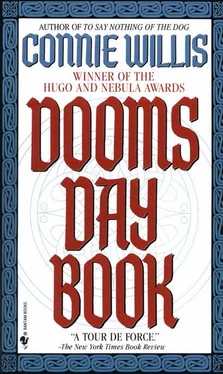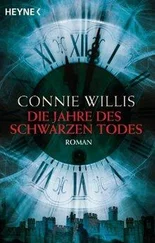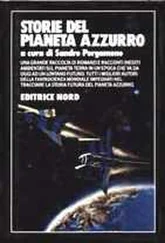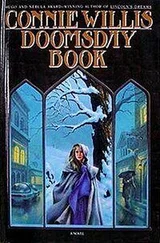Mary put a plaster on Latimer’s arm and motioned to Gilchrist. He shook his head at her. She went over to the medic and shook her awake. She followed her over to the tray, blinking sleepily.
“There are so many things only direct observation can tell us,” Montoya said. “I told Kivrin to record every detail. I hope there’s room on the corder. It’s so small.” She looked at her watch again. “Of course it had to be. Did you get a chance to see it before they implanted it? It really does look like a bone spur.”
“Bone spur?” Dunworthy said, watching the medic’s blood spurt into the vial.
“That’s so it can’t cause an anachronism even if it’s discovered. It fits right against the palmar surface of the scaphoid bone.” She rubbed the wrist bone above the thumb.
Mary motioned to Dunworthy, and the medic stood up, rolling down her sleeve. Dunworthy took her place in the chair. Mary peeled the back from a monitor, stuck it to the inside of Dunworthy’s wrist, and handed him a temp to swallow.
“Have the bursar call me at this number as soon as he returns,” Gilchrist said, and hung up.
Montoya snatched up the phone, punched in a number and said, “Hi. Can you tell me the quarantine perimeters? I need to know if Witney’s inside it? My dig’s there.” Whoever she was talking to apparently told her no. “Then who can I talk to about getting the perimeters changed? It’s an emergency.”
They’re worried about their “emergencies,” Dunworthy thought, and neither of them’s even given a thought to worrying about Kivrin. Well, what was there to worry about? Her corder had been disguised to look like a bone spur so it wouldn’t cause an anachronism when the contemps decided to chop off her hands before they burned her at the stake.
Mary took his blood pressure and then jabbed him with the punch. “If the phone ever becomes available,” she said, slapping on the plaster and motioning to Gilchrist, who was standing next to Montoya, looking impatient. “You might ring up William Gaddson and warn him that his mother’s coming.”
Montoya said, “Yes. The number for the National Trust,” hung up the phone, and scribbled a number on one of the brochures.
The phone trilled. Gilchrist, halfway to Mary, launched himself at it, grabbing it up before Montoya could reach it. “No,” he said and handed it grudgingly over to Dunworthy.
It was Finch. He was in the bursar’s office “Have you got Badri’s medical records?” Dunworthy said.
“Yes,sir. The police are here, sir. They’re looking for places to put all the detainees who don’t live in Oxford.”
“And they want us to put them up at Balliol,” Dunworthy said.
“Yes, sir. How many shall I tell them we can take?”
Mary had stood up, Gilchrist’s vial of blood in hand, and was signalling to Dunworthy.
“Wait a moment, please,” he said, and punched hold on the mouthpiece.
“Are they asking you to board detainees?” Mary asked.
“Yes,” he said.
“Don’t commit to filling all your rooms,” she said. “We may need infirmary space.”
Dunworthy took his hand away and said, “Tell them we can put them in Fisher and whatever rooms are left in Salvin. If you haven’t assigned rooms to the bellringers, double them up. Tell the police Infirmary has asked for Bulkeley-Johnson as an emergency ward. Did you say you’d found Badri’s medical records?”
“Yes, sir. I had the very devil of a time finding them. The bursar had filed them under Badri comma Chaudhuri, and the Americans—”
“Did you find his NHS number?”
“Yes, sir.”
“I’m putting Dr. Ahrens on,” he said before Finch could launch into tales of the bell ringers. He motioned to Mary. “You can give her the information directly.”
Mary attached a plaster to Gilchrist’s arm and a temp monitor to the back of his hand.
“I got through to Ely, sir,” Finch said. “I informed them of the handbell concert cancellation and they were quite pleasant, but the Americans are still very unhappy.”
Mary finished entering Latimer’s reads, stripped off the gloves and came over to take the phone from Dunworthy.
“Finch? Dr. Ahrens here. Read me Badri’s NHS number.”
Dunworthy handed her his Secondaries sheet and a pencil, and she wrote it down and then asked for Badri’s inoculation records and made a number of notations Dunworthy couldn’t decipher.
“Any reactions or allergies?” There was a pause, and then she said, “All right, no. I can get the rest off the computer,” she said. “I’ll ring you back if I need additional information.” She handed the phone back to Dunworthy. “He wants to speak with you again,” she said, and left, taking the paper with her.
“They’re most unhappy at being kept here,” Finch said. “Ms. Taylor is threatening to sue for involuntary breach of contract.”
“When was Badri’s last course of antivirals?”
Finch took a considerable time looking through the sheaf of printouts, Scriptures and lavatory paper tallies. “Here it is, sir. September fourteenth.”
“Did he have the full course?”
“Yes, sir. Receptor analogues, MPA booster, and seasonals.”
“Has he ever had a reaction to an antiviral?”
“No, sir. There’s nothing under Allergies in the history. I already told Dr. Ahrens that.”
Badri had had all his antivirals. He had no history of reactions.
“Have you been to New College yet?” Dunworthy asked.
“No, sir, I’m just on my way. What should I do about supplies, sir? We’ve adequate stores of soap, but we’re very low on lavatory paper.”
The door opened, but it wasn’t Mary. It was the medic who had been sent to fetch Montoya. He went over to the tea trolley and plugged in the electric kettle.
“Should I ration the toilet paper, do you think, sir,” Finch said, “or put up notices asking everyone to conserve?”
“Whatever you think best,” Dunworthy said and rang off.
It must still be raining. The medic’s uniform was wet, and when the kettle boiled, he put his red hands over the steam, as if trying to warm them.
“Are you quite finished using the telephone?” Gilchrist said.
Dunworthy handed it to him. He wondered what the weather was like where Kivrin was, and whether Gilchrist had had Probability compute the chances of her coming through in the rain. Her cloak had not looked specially waterproof, and that friendly traveller who was supposed to come along within l.6 hours would have holed up in a hostelry or haymow till the roads dried enough to be passable.
Dunworthy had taught Kivrin how to make a fire, but she could hardly do so with wet kindling and numb hands. Winters in the 1300’s had been cold. It might even be snowing. The Little Ice Age had just begun in 1320, the weather eventually getting so cold that the Thames froze over. The lower temps and erratic weather had played such havoc with the crops that some historians blamed the Black Death’s horrors on the malnourished state of the peasants. The weather had certainly been bad. In the autumn of 1348, it had rained in one part of Oxfordshire every day from Michaelmas to Christmas. Kivrin was probably lying there on the wet road, half-dead from hypothermia.
And broken out in a rash, he thought, from her over-doting tutor worrying too much about her. Mary was right. He did sound like Mrs. Gaddson. The next thing he knew he’d be plunging off into 1320, forcing the doors of the net open like Mrs. Gaddson on the tube, and Kivrin would be as glad to see him as William was going to be to see his mother. And as in need of help.
Kivrin was the brightest and most resourceful student he had ever had. She surely knew enough to get in out of the rain. For all he knew, she had spent her last vac with the Eskimos, learning to build an igloo.
Читать дальше












